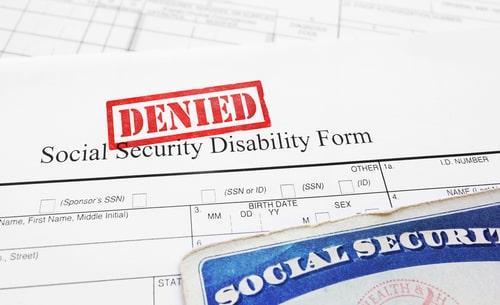33 N. Dearborn Street, Suite 1130, Chicago, IL 60602
5 Convenient Locations
Recent Blog Posts
Accounting for All of a Person's Limitations in Assessing a Disability Claim
 One of the steps in assessing an application for Social Security disability benefits is looking at what jobs, if any, a person could perform when taking into account all of their physical and mental limitations. This is normally accomplished by having the administrative law judge (ALJ) posing a “hypothetical question” to a vocational expert (VE) during a disability hearing. It is critical that the ALJ includes all of the applicant's impairments in posing this question; otherwise, the VE's answer may not accurately reflect the applicant's actual job potential.
One of the steps in assessing an application for Social Security disability benefits is looking at what jobs, if any, a person could perform when taking into account all of their physical and mental limitations. This is normally accomplished by having the administrative law judge (ALJ) posing a “hypothetical question” to a vocational expert (VE) during a disability hearing. It is critical that the ALJ includes all of the applicant's impairments in posing this question; otherwise, the VE's answer may not accurately reflect the applicant's actual job potential.
Illinois Judge Orders Social Security to Reconsider Limits on Applicant's “Concentration, Persistence, and Pace”
Here is a recent example of an ALJ failing to ask the right question. In Kenneth L. v. Saul, the plaintiff applied for Supplemental Security Income (SSI) benefits from Social Security. SSI is a need-based program available to low-income individuals who meet the same disability criteria as for Social Security Disability Insurance benefits. So the legal issues in this case would be equally applicable to a plaintiff seeking disability benefits.
Social Security Disability Claims and Second Opinions
 When you apply for disability benefits, Social Security will consider the medical opinions of your treating physician as well as non-examining consultants. These consultants basically review your medical records and offer a separate opinion as to your physical or mental impairments. In some cases, a Social Security administrative law judge (ALJ) may decide the non-examining doctors provide a more complete or accurate view of your condition than your own physician.
When you apply for disability benefits, Social Security will consider the medical opinions of your treating physician as well as non-examining consultants. These consultants basically review your medical records and offer a separate opinion as to your physical or mental impairments. In some cases, a Social Security administrative law judge (ALJ) may decide the non-examining doctors provide a more complete or accurate view of your condition than your own physician.
Magistrate Orders New Hearing on Deceased Man's Disability Claim
But what if a non-examining doctor reviews the exact same information as your treating physician and simply offers a different opinion? For instance, could a consultant look at the tests performed by your doctor and tell the ALJ they mean something different then what your doctor concluded?
A recent decision from an Illinois federal magistrate judge, Mary T. ex. rel. Falauren T. v. Saul, presented just such a scenario. This case sadly involves a now-deceased applicant for disability benefits. The applicant's mother actually continued the case following her son's death.
When Will a Judge Award Me Social Security Disability Benefits
 There are multiple levels to the process of reviewing an application for Social Security disability benefits. An administrative law judge (ALJ) employed by the Social Security Administration (SSA) normally conducts a hearing and issues a decision to grant or deny benefits. If the ALJ denies benefits, the applicant can then file an internal appeal with SSA, and if that fails, file a lawsuit against the agency in federal court.
There are multiple levels to the process of reviewing an application for Social Security disability benefits. An administrative law judge (ALJ) employed by the Social Security Administration (SSA) normally conducts a hearing and issues a decision to grant or deny benefits. If the ALJ denies benefits, the applicant can then file an internal appeal with SSA, and if that fails, file a lawsuit against the agency in federal court.
But even if a federal judge agrees with the applicant that the ALJ's decision was incorrect, the court will typically not award disability benefits directly. Instead, the court will remand–return–the case to Social Security for a new ALJ hearing, effectively restarting the entire process. However, in rare cases, a court may decide this is unnecessary and simply order Social Security to start paying disability benefits.
Seventh Circuit: Applicant's Age, Limited Education, and Prior Work Experience Justify Award of Benefits Without a Third Hearing
How Does a Person's Illiteracy Affect Their Claim for Disability Benefits?
 It may surprise you to learn that roughly one in five American adults struggle with basic literacy. This is according to figures published by the U.S. Department of Education's National Center for Education Statistics. Specifically, this group representing approximately 20 percent of adults “have difficulty” with completing tasks that involve “comparing and contrasting information, paraphrasing, or making low-level inferences.” Now you may be wondering if illiteracy qualifies a person for Social Security disability benefits. The short answer is no; the mere fact a person has little or no literacy skills is not considered a disability as such. But for applicants between the ages of 45 and 54, Social Security will consider illiteracy as a factor in favor of awarding disability benefits.
It may surprise you to learn that roughly one in five American adults struggle with basic literacy. This is according to figures published by the U.S. Department of Education's National Center for Education Statistics. Specifically, this group representing approximately 20 percent of adults “have difficulty” with completing tasks that involve “comparing and contrasting information, paraphrasing, or making low-level inferences.” Now you may be wondering if illiteracy qualifies a person for Social Security disability benefits. The short answer is no; the mere fact a person has little or no literacy skills is not considered a disability as such. But for applicants between the ages of 45 and 54, Social Security will consider illiteracy as a factor in favor of awarding disability benefits.
Magistrate: Social Security “Failed to Properly Evaluate” Disability Applicant's Illiteracy
When Is a “Consultant's” View of a Medical Condition More Credible a Doctor in a Disability Case?
 Social Security often denies applications for disability benefits based on the testimony of “agency consulting physicians.” These are doctors who review an applicant's medical records without personally examining or treating the applicant. In some cases, a Social Security administrative law judge (ALJ) will give greater weight to the opinions of the agency consultants over the treating physicians. This is permitted under Social Security regulations, provided the consultant's opinions are consistent with the available medical evidence.
Social Security often denies applications for disability benefits based on the testimony of “agency consulting physicians.” These are doctors who review an applicant's medical records without personally examining or treating the applicant. In some cases, a Social Security administrative law judge (ALJ) will give greater weight to the opinions of the agency consultants over the treating physicians. This is permitted under Social Security regulations, provided the consultant's opinions are consistent with the available medical evidence.
Appeals Court Questions Social Security's Conclusions Regarding Disability Applicant's Ability to “Reach Overhead”
Here is an example of a case where an ALJ improperly credited an agency consultant. In Gibbons v. Saul, the plaintiff applied for disability benefits approximately seven years ago. The plaintiff suffered from severe chronic pain in his neck, shoulders, and arms. Several doctors provided medical evidence with respect to the plaintiff's condition.
Addressing the “Severity” of a Person's Fibromyalgia in a Disability Case
 Fibromyalgia is one of the more difficult medical conditions to address in the context of applying for Social Security disability insurance. The medical definition of fibromyalgia, according to the U.S. Centers for Disease Control and Prevention, is a “condition that causes pain all over the body (also referred to as widespread pain), sleep problems, fatigue, and often emotional and mental distress.” While fibromyalgia can manifest itself through these symptoms, there is no simple medical “test” that can diagnose a patient with the condition.
Fibromyalgia is one of the more difficult medical conditions to address in the context of applying for Social Security disability insurance. The medical definition of fibromyalgia, according to the U.S. Centers for Disease Control and Prevention, is a “condition that causes pain all over the body (also referred to as widespread pain), sleep problems, fatigue, and often emotional and mental distress.” While fibromyalgia can manifest itself through these symptoms, there is no simple medical “test” that can diagnose a patient with the condition.
As a result, Social Security administrative law judges (ALJs) tend to discount subjective complaints of pain by disability applicants as insufficient to prove their fibromyalgia prevents them from working. Illinois courts have repeatedly told Social Security, however, that ALJs cannot require such “objective” tests to confirm a fibromyalgia diagnosis.
Will Social Security Take My Bipolar Disorder Seriously?
 There is a tendency among Social Security officials to take claims involving psychological impairments less seriously than those involving physical impairments. Legally, this should not matter. If a person is unable to work due to a documented mental disorder, they are just as entitled to disability benefits as someone with a physical impairment. Unfortunately, that is not always the reality.
There is a tendency among Social Security officials to take claims involving psychological impairments less seriously than those involving physical impairments. Legally, this should not matter. If a person is unable to work due to a documented mental disorder, they are just as entitled to disability benefits as someone with a physical impairment. Unfortunately, that is not always the reality.
Illinois Magistrate Orders a New Hearing, Criticizes ALJ for “Playing Doctor”
Take this recent decision from an Illinois federal magistrate judge, Anthony S. v. Saul. In this case, a 55-year-old man (the plaintiff) applied for disability benefits, citing a number of psychological impairments, including post-traumatic stress disorder and bipolar disorder. After a hearing, a Social Security administrative law judge (ALJ) determined these impairments did not prevent the plaintiff from performing some types of “light work” and denied his disability claim.
What If Social Security Thinks My Condition Is Intermittent?
 Even if you have a physical or mental impairment that qualifies you for Social Security disability, the government will cease paying those benefits if you reach “medical improvement.” In other words, if a doctor determines your impairments no longer prevent you from working, Social Security will find you no longer qualify as legally disabled. In some cases, Social Security may even determine you have already reached medical improvement by the time it considers your disability benefits application.
Even if you have a physical or mental impairment that qualifies you for Social Security disability, the government will cease paying those benefits if you reach “medical improvement.” In other words, if a doctor determines your impairments no longer prevent you from working, Social Security will find you no longer qualify as legally disabled. In some cases, Social Security may even determine you have already reached medical improvement by the time it considers your disability benefits application.
Federal Court Finds Social Security Officials Improper “Playing Doctor” Once Again
But as with all such determinations, Social Security must rely on the actual medical evidence presented. Agency officials are not supposed to engage in conjecture or render their own non-expert medical findings. Yet we continue to see cases where Social Security administrative law judges improperly “play doctor,” particularly in situations where a disability applicant has a difficult-to-diagnose impairment.
Does Social Security Have to Give a Reason for Denying My Disability Application?
 When a Social Security administrative law judge (ALJ) denies your application for disability benefits, they must give credible reasons for that denial. It is not enough for the ALJ to simply state you failed to provide enough evidence. The ALJ is required to provide sufficient reasons so that a reviewing court can later decide if those reasons were valid. An ALJ who fails to give such reasons, but instead offers nothing more than a lazy or “perfunctory” analysis of the applicant's case, is subject to summary reversal by a federal court.
When a Social Security administrative law judge (ALJ) denies your application for disability benefits, they must give credible reasons for that denial. It is not enough for the ALJ to simply state you failed to provide enough evidence. The ALJ is required to provide sufficient reasons so that a reviewing court can later decide if those reasons were valid. An ALJ who fails to give such reasons, but instead offers nothing more than a lazy or “perfunctory” analysis of the applicant's case, is subject to summary reversal by a federal court.
Magistrate Chides ALJ for “Perfunctory” Analysis of Disability Claim
Here is an example of what we mean. This is taken from a recent decision by a federal magistrate judge here in Illinois, Jonie G. v. Saul. In this case, a plaintiff applied for disability benefits and appeared at a hearing before an ALJ in 2016. The ALJ ended up denying the plaintiff's application, which Social Security later upheld in its internal appeals process.
Appealing an SSDI Decision to Disregard a Physician's Expert Opinion
 Social Security disability cases are supposed to center on medical evidence, in particular, the diagnosis and expert views of the applicant's treating physicians. Social Security administrative law judges (ALJs) are normally expected to give “controlling weight” to a treating physician's views. If the ALJ discounts or rejects this testimony, there are a number of regulatory factors that must be considered and explained.
Social Security disability cases are supposed to center on medical evidence, in particular, the diagnosis and expert views of the applicant's treating physicians. Social Security administrative law judges (ALJs) are normally expected to give “controlling weight” to a treating physician's views. If the ALJ discounts or rejects this testimony, there are a number of regulatory factors that must be considered and explained.
Magistrate: ALJ Failed to Follow Agency Regulations Before Discounting Doctor's Evidence
But as we have often found in practice, ALJs often disregard treating-physician evidence without giving a valid explanation, or even any explanation at all that conforms to the agency's own regulatory factors. A recent decision from a federal magistrate judge here in Illinois, Deborah AM v. Saul, offers a textbook example of this problem.
In this case, the plaintiff applied for disability benefits nearly five years ago. Following a hearing on the plaintiff's application, a Social Security ALJ held she did not legally qualify for disability benefits. The ALJ reached this conclusion after deciding not to give controlling weight to the evidence offered by the plaintiff's treating physician.






 312-999-0999
312-999-0999 312-999-8999
312-999-8999




